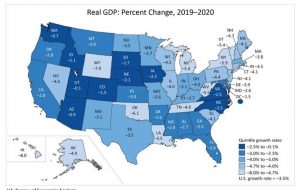Illinois economy shrinks 4 percent in 2020 despite late growth
By Peter Hancock Capitol News Illinois — May 3, 2021
The Illinois economy, along with all other state economies, contracted during 2020 as a result of the COVID-19 pandemic. (Source: U.S. Bureau of Economic Analysis)
SPRINGFIELD – The Illinois economy shrank by 4 percent in 2020 as the COVID-19 pandemic wreaked havoc on many of its sectors, although there were signs of a recovery taking place late in the year.
Those preliminary numbers, released last week by the U.S. Department of Labor’s Bureau of Economic Analysis, showed that the leisure, hospitality and food service sector was the hardest hit by the pandemic, reporting a nearly 30 percent drop in economic output for the year.
That was due to the forced closure of bars, restaurants, theaters, amusement parks and most tourist attractions in the early phases of the pandemic, as well as the cancellation of large conventions and business meetings.
“You look at the various industries, many of which got impacted by COVID, but I don’t think any industry was impacted as much as hotels and tourism,” Michael Jacobson, executive director of the Illinois Hotel and Lodging Association, said during an interview. “We saw the impacts begin before some people even realized what COVID was because you started seeing conventions and large-scale meetings begin to cancel. And unfortunately, those same events that really are the lifeblood of our industry, are going to be some of the last events to begin back up again.”
According to BEA, real gross domestic product decreased in all 50 states and the District of Columbia in 2020. Utah, with a 0.1 percent shrinkage rate, fared the best, while Hawaii’s state economy shrank 8 percent. The average shrinkage rate for the U.S. as a whole was 3.5 percent.
Accommodation and food services were a contributing factor to the declines in all 50 states and D.C., and they were the leading contributor to the decreases in 38 states plus D.C.
Other industries that suffered in Illinois included transportation and warehousing, down 14 percent; nongovernment services, down 12.3 percent; manufacturing, down 7.3 percent; wholesale trade, down 5 percent; and retail trade, down 2.3 percent.
The one bright spot in the state’s economy was the agriculture sector, which grew by nearly 68 percent over the previous year. That was largely the result of a bad harvest year in 2019, followed by a good one in 2020.
When the numbers are broken out on a quarterly basis, however, the biggest drop in economic output occurred during the 2nd quarter, April-June, when Illinois was under the most severe economic restrictions. The economy began to pick up in the 3rd quarter, and by the 4th quarter was growing at an annualized rate of 3.5 percent.
But the recovery has not been even across all sectors, and the leisure and hospitality industries continue to suffer.
Jacobson says he does not expect the hotel industry to come back fully to pre-pandemic levels until sometime in 2024. The question for his industry, he said, is how many hotels will be able to survive financially until that time.
“I mean, you’ve seen some very notable hotel names across the state, the Palmer House being one of our largest hotels in the state, and obviously the most notable one that’s been foreclosed so far,” he said. “But if a hotel that size, owned by one of the large real estate investment companies can get foreclosed, imagine the little guys who own most of the hotels in our state, how bad they’re suffering.”
phancock@capitolnewsillinois.com







